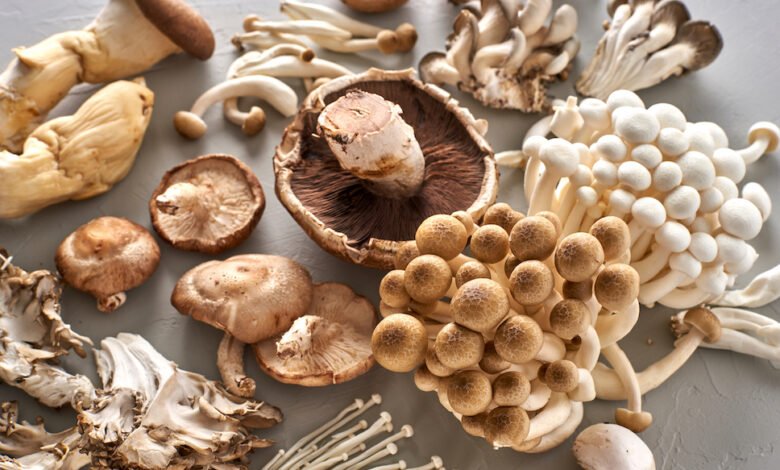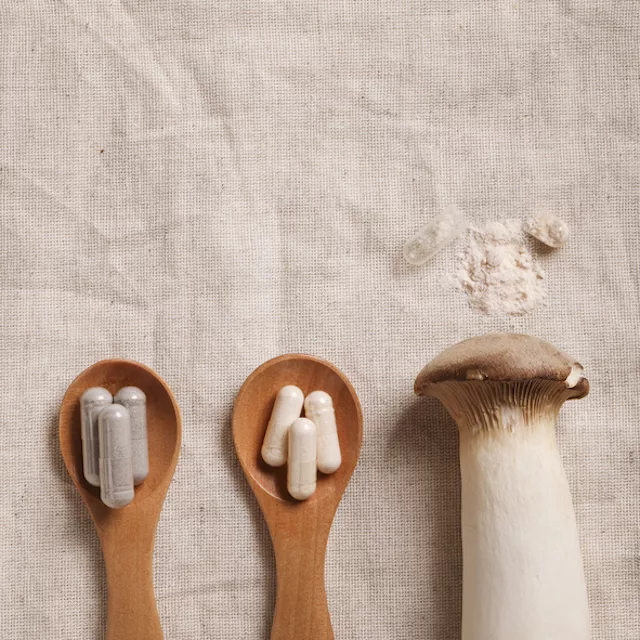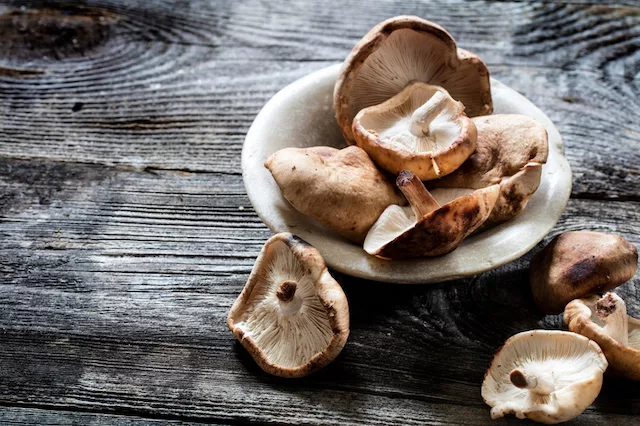Mushroom Guide: All About Fungi For Health

Medicinal mushrooms have been around for centuries as the ultimate functional food. Ayurvedic medicine and researchers alike recognize medicinal mushrooms for their wide range of health benefits. In fact, many believe that mushrooms boast over 130 medicinal functions.
In this guide, we cover everything that you need to know about the benefits of using medicinal mushshrooms, including a deep dive into the most popular types and must-try recipes.
Medicinal Power of Mushrooms
Medicinal mushrooms are fungi that provide therapeutic benefits. As far back as 450 BCE, the Greek physician Hippocrates traced the use of medicinal mushrooms and turned to amadou mushrooms for wound healing and anti-inflammatory purposes. Additionally, Chinese alchemists have been using mushrooms medicinally since the 5th century.
Although mushrooms have been around for thousands of years, modern science has been working quickly to catch up on the healing potential of fungi. To date, there have been over 600 studies investigating their potential.
The fascinating advantages of using mushrooms medicinally can range from strengthening your immune system, to heart and liver health, and cognitive improvements. Mainly, we can credit the health benefits to the bioactive compounds that mushrooms deliver.
Here is a closer look at the top bioactives responsible for the healing properties of medicinal mushrooms:
- Antioxidants: Ergothioneine and glutathione, as antioxidants, actively help protect against oxidative stress commonly caused by free radicals.
- Polysaccharides: Beta-glucan, a sugar that provides structural benefits, is able to stimulate the immune system against external threats.
- Proteins: proteins such as lectins bind with the polysaccharides found in mushrooms to amplify immune system function. Most mushroom proteins contain all the essential amino acids.
- Terpenes: group of beneficial compounds known for their antimicrobial activities, potential to fight inflammation, role against oxidative stress, and ability to strengthen the immune system.
Moreover, edible mushrooms provide fiber, vitamins and minerals making them a valuable addition to a healthy diet. The amount and type of bioactives and nutrients present will vary depending on the type of mushroom at hand.
Exploring Mushroom Varieties
Around the world, there are an estimated 14,000 different species of mushrooms. Of those species, 2,000 are edible and 200 are considered to be medicinal.
However, mushrooms aren’t a heal-all solution. With so many different species out there, it’s important to understand the unique benefits that different medicinal mushrooms offer.
Here are the top 3 medicinal mushrooms and their benefits:

Reishi Mushroom: The Queen of Medicinal Mushrooms
- Species name: Ganoderma lucidum
- Commonly known as: reishi, lingzhi, “mushroom of immortality”
The reishi mushroom is arguably the most popular medicinal mushroom. Historically used in Chinese medicines, it since has made its way into the American Herbal Pharmacopoeia. Today, there’s an estimated 100 reishi-based products on the market including powders, teas, and dietary supplements.
Reishi mushrooms are highly nutritious. They provide minerals like calcium, magnesium, potassium, phosphorus, silica, and sulfur. Given their high concentration of bioactives like polysaccharides and terpenes, they offer a variety of health benefits.
The most well known benefits of reishi mushrooms include:
- Anti-tumor: Alongside conventional cancer treatments, some turn to reishi mushrooms to improve health outcomes. In human and animal studies, reishi mushrooms have exerted an inhibitory effect on cancer cells.
- Antimicrobial: Several in vitro and in vivo animal studies have cited the role of bioactives in reishi mushrooms against viral and bacterial infections. Smaller human studies have revealed reishi mushroom to improve treatment outcomes of common bacterial and viral infections. Although, researchers need to confirm the bioavailability of the antimicrobial components of reishi mushrooms.
- Sleep-inducing: An animal study showed that shoreishi mushroom extract can increase sleep time.
- Stress-reducing: Animal studies on triterpene extracts show that they can function as adaptogens. In true adaptogenic fashion, they have the potential to improve the body’s response to stress and lower cortisol levels. Reishi mushrooms have high amounts of triterpenes.
- Immune-boosting: A 2020 meta-analysis shows that the polysaccharides and triterpenes in reishi mushrooms may improve immune system function. It accomplishes this by activating and enhancing the defense cells that make up the immune system such as NK cells, T lymphocytes, and macrophages.
- Liver-protective: In animal studies, beta-glucan, found in reishi mushrooms, can offer protection against liver injury caused by popular toxin and carcinogen carbon tetrachloride.
Shiitake Mushroom: A Culinary Delight with Health Benefits
- Species name: Lentinula edodes
- Commonly known as: shiitake
The shiitake mushroom is both a medicinal mushroom and a savory culinary ingredient. Its meaty, umami-like flavor makes it a popular addition to noodles, sauteed or stir fry meals, and soups.
Japanese culture has historically used shiitake mushrooms as a medicinal food. Most people turn to shiitake mushrooms to help support:
- Bone health: Shiitake mushrooms that have been exposed to UV radiation are able to capture notable amounts of vitamin D, a critical nutrient for healthy bones. In fact, one study found that the bioavailability of vitamin D2 in mushrooms was just as effective at raising and maintaining levels of vitamin D in the blood as the highly absorbable vitamin D3.
- Heart health: Bioactives, like beta-glucans and sterols are abundant in shiitake mushrooms. These bioactives can help improve biomarkers indicative of good heart health such as cholesterol and blood pressure.
- Immune-boosting: Letninan, a polysaccharide native to shiitake mushrooms, helps enhance the function of a group of cells within the immune system called Th1 and Th2 that help ward off unwanted invaders to the body.

Lion’s Mane Mushroom: Nourishing the Brain
- Species name: Hericium erinaceus
- Commonly known as: lion’s mane, yamabushitake, and hericenones
Despite its fierce name, lion’s mane offers a mildly sweet flavor and chewy texture. As such, it is typically included in seafood dishes alongside other similarly textured meats like crab and lobster.
As a medicinal mushroom, lion’s mane has earned a reputation for providing cognitive benefits. In fact, lion’s mane provides erinacines and hericenones, bioactives that have the potential to pass through the blood-brain barrier with ease. As a result, they are able to deliver neurotropic and neuroprotective benefits. For instance:
- Healthy brain aging: In a human trial, participants who took 250 mg of dry lion’s mane powder saw increased scores on the Hasegawa Dementia Scale (HDS-R) at the 4 and 16 week marks compared to the placebo group. Researchers believe that this benefit may be related to the erinacines that lion’s mane provides.
- Memory boost: A study in humans showed that lion’s mane was able to help prevent impairment of short-term visual memory.
As mentioned earlier, there are many types of edible mushrooms available. AC mushroom, chaga, cordyceps, maitake, and the oyster mushroom are examples of other popular medicinal mushrooms.
3 Nutritious Mushroom Recipes
Functional foods are foods that supply benefits in addition to their nutritional value. To no surprise, many consider medicinal mushrooms to be functional foods.
Fortunately, medicinal mushrooms are quite simple to incorporate into a variety of beverages and dishes. If you’re curious about how to incorporate them into your daily menu, consider trying these simple medicinal mushroom recipes:
1. Morel Mushroom & Broccoli Stir Fry
Morel mushrooms are known for their antioxidant bioactivities. In terms of cooking, they are a popular choice for their umami-like flavor profile. They are popularly used in savory dishes such as this mushroom and broccoli stir fry.
Prep time: 10 mins
Total time: 20 mins
Makes: 2 servings
What you’ll need:
- 5 oz morel mushrooms, sliced
- ½ pound broccoli florets
- 2 tbsp water
- 1 tbsp soy sauce
- 1 tbsp rice vinegar
- 3 tsp sugar
- 3 tsp avocado oil
- 1 tsp garlic cloves, minced
- 1 tsp ginger, minced
- 1 tsp toasted sesame seeds (for garnish)
- Pinch of red pepper flakes
How to prepare:
- In a bowl, combine soy sauce, rice vinegar, and sugar until fully dissolved and set aside.
- Bring a nonstick skillet to medium heat and add avocado oil.
- Cook ginger, garlic, and red pepper flakes for about 20 to 30 seconds.
- Then, incorporate water, broccoli, and mushrooms. Allow broccoli to fully cook (usually 4 to 6 minutes).
- Add the sauce and cook for one more minute.
- Top with toasted sesame seeds and serve. Dish pairs well with a side of steamed white rice.
2. Reishi Mushroom Milk Tea
Reishi mushrooms are a versatile culinary ingredient. In addition to savory dishes, they are also an easy addition to everyday beverages including coffees and teas.
Prep time: 5 mins
Total time: 8 minutes
Makes: 1 serving
What you’ll need:
- 1 tsp reishi mushroom powder (store bought or made in a food processor)
- 1 tsp brown sugar
- 1 cup milk of choice, steamed
- Dash of cinnamon powder
How to prepare:
- Combine mushroom powder and brown sugar with steamed milk.
- Serve and sprinkle with cinnamon powder
- Optional: for an iced milk tea, allow drink to cool and serve over ice
3. Shiitake Mushroom & Vegetable Soup
Soups are a traditional way to consume mushrooms. This recipe offers a spin on vegetable soup by incorporating shiitake mushrooms for added flavor and health benefits.
Prep time: 15 minutes
Total time: 30 minutes
Makes: 2 servings
What you’ll need:
- 1 green onion, sliced
- 1.5 oz shiitake mushrooms, sliced
- 1.5 cups chicken or vegetable broth
- ¼ cup coconut aminos
- ¼ cup carrots, sliced
- ½ tsp garlic powder
- ½ tsp sesame oil
- dash of ground ginger
How to prepare:
- In a large pot, bring all ingredients to a boil, then cook for about 15 minutes.
- Remove from heat and serve.
Precautions and Considerations
As discussed, mushrooms have a long history of use for health maintenance.
In general, popular medicinal mushrooms are safe for consumption in food and supplemental forms. Side effects of taking mushrooms are typically mild and usually include:
- Dizziness
- Nasal, mouth, or throat dryness
- Nausea
- Rashes
- Stomach upset
Although side effects are temporary, researchers need to conduct additional studies to investigate the long-term safety of taking mushrooms.
It is also important to keep in mind that more research needs to be done to establish the optimal doses for different mushrooms. As of now, it can be difficult to fully know if a mushroom supplement will provide the optimal form and potency of a mushroom to make a difference in your health.
Lastly, mushrooms aren’t ideal for everybody. Individuals who are pregnant, breastfeeding, diagnosed with a medical condition, and/or taking prescription medications should consult their healthcare provider before incorporating mushrooms into their routine. People who have allergies to mushrooms should not consume them for medicinal or culinary purposes.
Conclusion
In conclusion, medicinal mushrooms provide a spectrum of health benefits. They are filled with powerful bioactives that are both protective and healing in nature. As a bonus, medicinal mushrooms offer sweet and savory flavor profiles for culinary enjoyment.
Source link
#Mushroom #Guide #Fungi #Health



